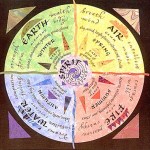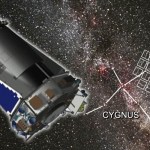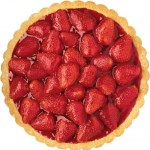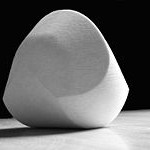math
I don't hate math, that is just the title of the post - notice that I put it in quotes.
As you may know, I teach this physics course for elementary education majors (using Physics and Everyday Thinking - which is awesome). The curriculum has very little math in it. That is not necessarily a good thing, but it helps the students understand science and the nature of science without bringing in this mental block they have for math. One of the activities has them look at the energy efficiency of different devices. At the end of the activity, they are asked:
A fluorescent bulb is 25% efficient…
"I do not feel obliged to believe that the same God who has endowed us with sense, reason, and intellect has intended us to forgo their use." -Galileo Galilei
Geez, Ethan, why don't you take on a bigger question?
This question of "fundamental things" has a special meaning to scientists and natural philosophers, going all the way back to Thales of Miletus, 2600 years ago, who began asking about the arche (αρχή), which is the "element" or "prime cause" of existing things.
Of course, the scientific enterprise was just beginning, so you can't fault Thales too much for coming up with "water". But…
The other day I found myself faced with six equations that needed to be solved algebraically. Just so you know, I am a big fan of paper for most of these cases - but this was out of control. I was making silly mistakes and causing all sorts of problems. What to do? My first though was to use some symbolic plugins for python. I tried sympy and it is nice. However, it was not giving correct solutions for solving 3 equations - I don't know if this is a bug or what.
Maxima
I think I found Maxima through Wikipedia's Computer algebra system page. It's free and free and runs on Mac OS X and…
It is that part of the semester where the Right Hand Rule (RHR) comes out. Really, the best part is the students taking the tests. They make all these funny motions with their hands. That makes tests more entertaining (for me) than they usually are.
What is the RHR?
Suppose I have two numbers. Maybe these two numbers are the length and width of a piece of paper. Now suppose I need to multiply length times width to get the area (A = L x W). Simple - right? But that is multiplication for scalar variables. How do you multiply vectors?
There are two common operations you can do with…
I was having a discussion with my father about the budgetpocalypse for universities. I don't know how it came up, but he asked: "What college is the department of Math in?" At Southeastern Louisiana University, the Department of Math is in the College of Science and Technology.
Here is a paraphrase of our conversation.
Me: That is odd. Math isn't a science, and it isn't really a technology. Well, I guess you could argue it is a technology.
Father: What? Math is a science. It is a pure science.
Me: I don't think it is a science. Science is all about models and seeing how they agree with…
"No pessimist ever discovered the secret of the stars, or sailed to an uncharted land, or opened a new doorway for the human spirit." -Helen Keller
If you've been paying attention, you heard that the Kepler mission, earlier this week, announced the discovery of 706 candidate planets orbiting stars in its field of view.
And while most of the planets it found were Neptune-sized or smaller, they were still mostly gas giants, and still mostly closer than Mercury to their parent stars. Kepler's looking at 100,000 stars, and while finding 706 planets is certainly not bad for just over a month's…
If you can't make it to the Tishman Auditorium in New York tonight to catch the highly anticipated program The Limits of Understanding, we've got you covered. The event will be streaming live, but we'll also be there to cover it, so follow along with the commentary alongside the video stream, and feel free to join in! The event starts at 8:00 EST. Moderator Sir Paul Nurse, a Nobel Laureate and President of Rockefeller University, will join mathematician Gregory Chaitin, philosopher Rebecca Newberger Goldstein, astrophysicist Mario Livio, and A.I. pioneer Marvin Minsky in a discussion about…
Sue from Math Mama Writes... sent me an email about wrapping a rope around a pole. In that post, Sue thinks about rope looped around a post. When you wrap a rope around a post, the friction between the rope and the post can help you hold something (like a horse) that is much stronger than you.
The first case she thinks about is using several posts. What if you wrap a rope around one post and pull? What if you use 2, or three posts? The idea is that if one posts 'multiplies' the force by 10, two posts would have an effect of multiplying by 100 and so forth. That seems reasonable.
The…
Martin Gardner, polymath, puzzle-master, and philosopher, died on Sunday at the age of 95. Though he never formally studied math more complicated than calculus at the high school level, Gardner was perhaps best known for his interest in "recreational mathematics," the series of math and logic puzzles he published in books and magazine columns for decades. Beyond his skills at making science communication and learning fun, he has endeared himself to the science community (and ScienceBlogs in particular) by being a prominent skeptic during the height of New Age mumbo-jumbo, and one of the…
Matt's Sunday Function this week is a weird one, a series that is only conditionally convergent:
So the sum of the infinite series, by inexorable logic, is both ln(2) and ln(2)/2. How is this possible?
Of course it isn't. The flaw in our logic is the assumption that the series has a definite sum - in the mathematical parlance, that it's absolutely convergent. This series is not, it's only conditionally convergent. In fact you can show (the great G.F.B. Riemann was the first) that with judicious rearrangement, you can get this series to converge to anything at all. As such it's only…
Hands on Science Museums are some of my favorites. When I travel I like to look up if the city I am going to has a Science Museum and check it out. Some of my favorite exhibits are usually in the physics and math types of areas with cool lasers or how you can use lenses to teach how light diffracts, but a Math Museum, where it is dedicated to JUST math?? That sounds pretty awesome too!
Meet mathematician and Nifty Fifty Speaker Glen Whitney who decided to demonstrate how super cool and fun math can really be, recently gave up a lucrative career as a hedge-fund algorithm manager in New York…
This is a question that comes up every now in then. But I would like to ask a few similar questions with my first order approximation answers. I would love to hear some other ideas on these questions.
Do people need a functional understanding of math to function in this world?
I say no. Maybe this is not a popular answer, but this is my first answer. Let me give my reasons. What percent of people in this world have a functional understanding of math? (let me just say functional understanding means they can do basic word problems and understand what is going on) If I estimate this…
I gave the following question on my last physical science (physical science for non-science majors) test:
Block A has a mass of 10 kg and volume of 100 cm3. Block B has a mass of 1 kg and a volume of 1 cm3. Which block has the greater density? Which block has the greater volume?
The results of this question are interesting. Of the respondents, 33 answered both parts in a meaningful way. 8 of these 33 answered that the one with the greatest density had the greatest volume (that is 24%). Most of these 24% said that 1 cm3 was greater than 100 cm3. However, there were some that said the…
I'm still getting things squared away after my blogging break, but as a step on the way back toward normal programming, here's a Dorky Poll: What kind of numbers do you most like to work with?
What kind of numbers do you like best?online surveys
You can only choose a single answer, which I'm sure will come as a disappointment to many of those favoring the later options. You could always vote a second time from a different computer, though...
In mathematics, you don't understand things. You just get used to them. -Johann von Neumann
Sometimes, I have to deal with series: lots of numbers all added together. Some series clearly approach a limit, like the following:
1 + 1/2 + 1/4 + 1/8 + 1/16 + 1/32 + ...
I can visualize this in terms of pies. (What do you want? I'm hungry!) One = one whole pie. So that first number starts me out with one whole pie.
When I add the second number in my series, I'm clearly adding half a pie to that, for a total of a pie and a half.
When I add the third term, I've now got one-and-three-quarters pies,…
I'm not really one for collecting things. The fact that I move around a lot twinned with the pathetic size of British homes, doesn't square well with building up much of anything. I finally dumped all my CDs last summer; I give away my books when I'm done with them. Plus, I always felt that collecting things was for people with more money than they knew what to do with.
Nevertheless, my current bedroom is as anonymous as a hotel room, and so I thought I should do what every self-repecting gentleman scholar did in times gone by: build myself a cabinet of curiosities. As the name suggests…
--A great NYT article on science museums and cabinets of curiosities:
This antic miscellany is dizzying. But there are lineaments of sustained conflict in the apparent chaos. Over the last two generations, the science museum has become a place where politics, history and sociology often crowd out physics and the hard sciences. There are museums that believe their mission is to inspire political action, and others that seek to inspire nascent scientists; there are even fundamental disagreements on how humanity itself is to be regarded. The experimentation may be a sign of the science museum's…
Oh, I know you missed it. Really, it wasn't your fault. Pi day fell on a Sunday, so how are you supposed to have pi-day activities in class? Don't let it stop you. You are better than that. Do the activity anyway. What to do? Here are some suggestions. (Suggestions aimed mostly at the high school level)
Plot Diameter vs. Circumference
This is a great one. Let your students find as many round things as they can (cylinders work the best - or flat stuff). Measure the circumference (you can use a string or a tape measure) and the diameter. Since the relationship between these two is…
I'm en route to the March Meeting in Portland, which involves a three-hour layover in Chicago, between two flights on Southwest, my preferred airline. I'm always impressed by how much more efficient Southwest seems that the other major airlines.
One weird manifestation of that efficiency is the flight plans that Southwest uses. Where most flights on other airlines seem to go back and forth between two cities over and over, Southwest's routes tend to roam all over the country. This morning's flight from Albany to Chicago continued on to San Antonio, TX, Phoenix, and San Jose. Another recent…
Pi day is March 14th - get it? (3.14) I am a big fan of Pi. Here is my first post to celebrate the awesomeness of Pi (I know this is early, but I was too excited to wait).
How can you determine Pi?
Oh sure, tons of high schools do the classic experiment. Measure the circumference and diameter of as many round things as possible. Plot diameter vs. circumference. The slope will be Pi. Really, this is a great lab to do for all sorts of ages. The key thing is that students can see what Pi really means. I am not going to talk about this lab, I am going to do some thing cooler.
What if I…




